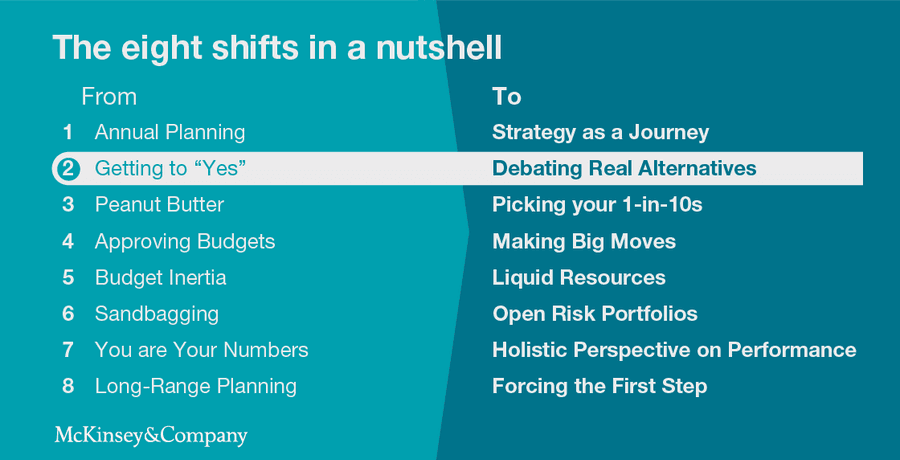Simply labeling a plan ‘strategic’ doesn’t make it so
Curated from: mckinsey.com
Ideas, facts & insights covering these topics:
6 ideas
·1.24K reads
6
Explore the World's Best Ideas
Join today and uncover 100+ curated journeys from 50+ topics. Unlock access to our mobile app with extensive features.
The essence of strategic planning
Business leaders know well that in a strategy meeting, the goal is to simply approve or reject a proposal put forward without questioning the plan or floating alternative options that can cause distress.
It shouldn't be this way. The key to strategy development is to weigh strategic alternatives.
- The goal of the strategy is to make difficult-to reverse decisions on how to win.
- Planning is how to make those choices happen.
In strategic planning discussions, we often skip over the first step and simply move to the second. However, using certain shifts can help to improve your strategy.
53
471 reads
Frame the strategy as choices
Instead of seeing your strategy meeting as a plan-making exercise, reframe the agenda to focus on making choices.
- One way is to build a strategy decision grid that consists of the key axes of hard-to-reverse choices.
- Then for each of them, describe three to five possible alternatives.
- Next, focus on your discussion and analysis of the most difficult choices.
47
254 reads
Calibrate your strategy
Compare your plan to some benchmarks. The chance of a strategy leading to significant performance improvement depends on an analysis of your company's starting endowment, the trends it is riding, and the moves you are planning.
The result is a realistic and concrete future to discuss. You may find your traditional strategic options won't work and may need to consider alternatives that may require making bigger or different moves than you made before.
42
150 reads
Compare alternative plans
Direct the discussion to focus on strategic alternatives that management thinks will be at similar risk and return levels. Then ask the team to consider which big move to make.
You could also show different plan scenarios with varying levels of resources and risk. This can help you make real trade-offs instead of all-or-nothing choices.
44
123 reads
Track assumptions over time
After the plan is developed, the detailed assumptions may be forgotten. Few review the underlying assumptions, such as uptake rates, market growth, and inflation rates.
We shouldn't assume that we know the future. Instead, consider what you can do with the information you have today and build explicit trigger points into the strategy to revisit decisions as you learn.
43
112 reads
Remove bias from decisions
Private-equity firms have found that more than 30% of decisions are different when opposing possibilities are pitted against each other.
Another de-biasing technique is a pre-mortem, where the team assumes a strategy has failed to achieve its intended objective after a set period. Then you brainstorm what caused the failure and how you could've avoided it.
44
130 reads
IDEAS CURATED BY
Rosalie P.'s ideas are part of this journey:
Learn more about leadershipandmanagement with this collection
Essential product management skills
How to work effectively with cross-functional teams
How to identify and prioritize customer needs
Related collections
Similar ideas
4 ideas
How to take the ‘outside view’
mckinsey.com
6 ideas
Essentials of Innovation
mckinsey.com
5 ideas
Achieving win-win spin-offs
mckinsey.com
Read & Learn
20x Faster
without
deepstash
with
deepstash
with
deepstash
Personalized microlearning
—
100+ Learning Journeys
—
Access to 200,000+ ideas
—
Access to the mobile app
—
Unlimited idea saving
—
—
Unlimited history
—
—
Unlimited listening to ideas
—
—
Downloading & offline access
—
—
Supercharge your mind with one idea per day
Enter your email and spend 1 minute every day to learn something new.
I agree to receive email updates



